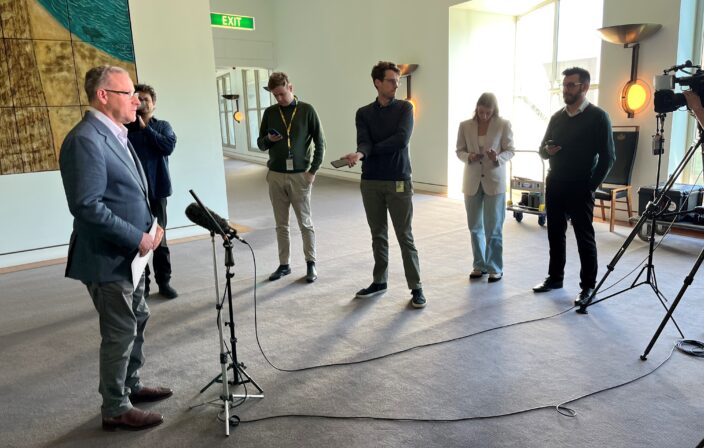Andrew McKellar interview with Patricia Karvelas, ABC RN Breakfast
25 Aug 2022
|Transcripts
Event: Andrew McKellar interview with Patricia Karvelas, ABC RN Breakfast.
Speakers: Andrew McKellar, chief executive Australian Chamber of Commerce and Industry; Patricia Karvelas, host ABC RN Breakfast
Date: 25 August 2022.
Topics: Jobs and Skills Summit, industry-wide bargaining, enterprise bargaining, real wage growth, productivity growth, skilled migration income threshold.
E&OE
Patricia Karvelas, host ABC RN Breakfast: Sector-wide enterprise bargaining and a minimum wage for skilled migrants are just some of the proposals being put forward by the unions ahead of next week’s Job’s Summit. Getting unions and business on the same page on industrial relations will be key to the summit’s success, and arguably its greatest challenge. A task no government has achieved in almost four decades. Andrew McKellar is the chief executive of the Australian Chamber of Commerce and Industry. He joins you from our Parliament House studio. Andrew, lovely to have you on the show.
Andrew McKellar, chief executive Australian Chamber of Commerce and Industry: Good morning, Patricia. Great to be with you.
Patricia: As AiGroup’s Innes Willox says, this is a road everyone’s been down before many times. Do you think this summit has a better chance of delivering tangible changes than past efforts?
Andrew: Well, we want the summit to get some good outcomes, so we’ll come with some very positive ideas and suggestions. We need to see the summit achieving results. It needs to be the restart of an economic reform agenda for Australia. That’s important. It’s a great opportunity. But honestly, if we’re talking about industry-wide bargaining replacing enterprise bargaining, then that really does jeopardize the relationship between employers and employees, the ability to bargain in good faith. Innes Willox is right. It is a road we’ve been down before. It’s one-size-fits-all. It’s not something that I think business would be very attracted to at all. And frankly, what it amounts to is a reversal of the sort of reforms that we saw back in the Hawke and Keating era. So, I don’t think that’s a good start.
Andrew: Unions are prepared to accept the need to lift migration. How open to their proposed changes to enterprise bargaining, particularly negotiating with multiple employers at once across entire sectors are you?
Patricia: Oh look, we’re not. I don’t think that’s-
Andrew: Okay. They say you cannot get wages moving unless you get this kind of more broad-based industry-based negotiation to get them moving. Do you accept that?
Andrew: No.
Patricia: Well, how are wages going to get moving then?
Andrew: No, the point here is we need to make sure that enterprise bargaining can work, at the moment it’s tied in knots. The rules the Commission are required to apply just don’t encourage that flexibility, they don’t link back into productivity, and they discourage parties from getting into negotiations. What we’ve got to have is an approach where it’s simplified, the Commission is able to apply a simple set of rules that apply to everybody. If we can do that, if we can get that sort of confidence back in the system, then I think we can get real productivity improvements at the enterprise level, and in return, you get real wage increases. I think that’s what we want to see.
Patricia: The ACTU says real wages have risen only 1 per cent over the past decade while productivity has increased 13 per cent. Executive salaries are rising. Does that mean that ordinary workers are missing out?
Andrew: Well in fact, I dispute their figures. I think there’s a number of different ways you can look at this. But when we are looking at what’s been happening with real wages, even over the past decade, real wages have grown more rapidly than productivity growth. I think we want to see productivity growing more strongly. That’s the way to get real wages going. If we can get that, then we will see increases in living standards and higher wages. That’s something that business fully agrees to, but we can’t have a situation where it’s simply nominal wages chasing inflation, pushing up costs. That’s just going to lead to higher price increases and higher interest rates.
Patricia: Just a couple of questions and we’re running out of time, so let’s do this quickly. What about the proposal for a minimum annual salary of $91,000 a year for skilled workers? Do you see that as a serious claim or is it an ambit claim?
Andrew: It’s definitely an ambit claim, and I think we heard Sally McManus say as much on 7:30 last night. There is this income threshold that applies to skilled migrants. At the moment it’s just over $53,000 a year. We think that can go up. We think a number of around $59,000, maybe $60,000, is fair enough. What we’d actually like to see is something that is more flexible by industry or by the area and by the skill level. Then I think that would be something that could work. But if you go with just this blanket $91,000, it’s going to cut out a huge part of the migration program. Areas like aged care, for example.
Patricia: Andrew McKellar, thank you for your time this morning.
Andrew: Thanks Patricia.
Patricia: Chief executive of the Australian Chamber of Commerce and Industry, Andrew McKellar.


